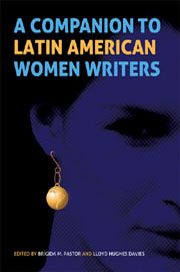Book contents
- Frontmatter
- Contents
- Introduction: The Feminine Voice in Latin American Literature
- 1 Sor Juana Inés de la Cruz (1648/51?–1695)
- 2 Gertrudis Gómez de Avellaneda (1814–1873)
- 3 Gabriela Mistral (1889–1957)
- 4 Alfonsina Storni (1892–1938)
- 5 Silvina Ocampo (1903–1993)
- 6 Clarice Lispector (1920–1977)
- 7 Rosario Castellanos (1925–1974)
- 8 Elena Poniatowska (1933– )
- 9 Alejandra Pizarnik (1936–1972)
- 10 Luisa Valenzuela (1938– )
- 11 Isabel Allende (1942– )
- 12 Rosario Ferré (1938– )
- 13 Laura Esquivel (1950– )
- 14 Laura Restrepo (1950– )
- Conclusion
- Bibliography
- Index
7 - Rosario Castellanos (1925–1974)
Published online by Cambridge University Press: 05 February 2013
- Frontmatter
- Contents
- Introduction: The Feminine Voice in Latin American Literature
- 1 Sor Juana Inés de la Cruz (1648/51?–1695)
- 2 Gertrudis Gómez de Avellaneda (1814–1873)
- 3 Gabriela Mistral (1889–1957)
- 4 Alfonsina Storni (1892–1938)
- 5 Silvina Ocampo (1903–1993)
- 6 Clarice Lispector (1920–1977)
- 7 Rosario Castellanos (1925–1974)
- 8 Elena Poniatowska (1933– )
- 9 Alejandra Pizarnik (1936–1972)
- 10 Luisa Valenzuela (1938– )
- 11 Isabel Allende (1942– )
- 12 Rosario Ferré (1938– )
- 13 Laura Esquivel (1950– )
- 14 Laura Restrepo (1950– )
- Conclusion
- Bibliography
- Index
Summary
No me toques el brazo izquierdo. Duele
de tanta cicatriz.
Dicen que fue un intento de suicidio
pero yo no quería más que dormir
profunda, largamente como duerme
la mujer que es feliz.
[Do not touch my left arm. It hurts
from so much scarring.
They say it was a suicide attempt
but I only wanted to sleep deeply, the long sleep
of the happy woman.]
The ominous nature of Rosario Castellanos's poem ‘Advertencia al que llega’ [‘Warning to the Person Arriving’] constitutes a forceful introduction to her work as a whole with its references to pain, scarring and the desire for silence and death. Castellanos is quite rightly considered a pioneering force in Mexican literature of the twentieth century. Indeed, Elena Poniatowska describes her as, ‘la precursora intelectual de la liberación de las mujeres mexicanas’ [the intellectual precursor of Mexican women's liberation] (1985: 22). Her output was prolific and included novels, short stories, many collections of poetry, drama and essays. She worked in various capacities as an academic, journalist and diplomat, and was a formidable presence in Mexican literary circles from the 1950s onwards. Castellanos was born and raised in Comitán in the southern state of Chiapas, which forms the backdrop for much of her early work, the child of wealthy landowners. Her family lost their lands as the result of President Lázaro Cárdenas's six-year regime, during which major land reforms were implemented and vast tracts of land holdings were transferred to indigenous owners.
- Type
- Chapter
- Information
- A Companion to Latin American Women Writers , pp. 105 - 122Publisher: Boydell & BrewerPrint publication year: 2012

